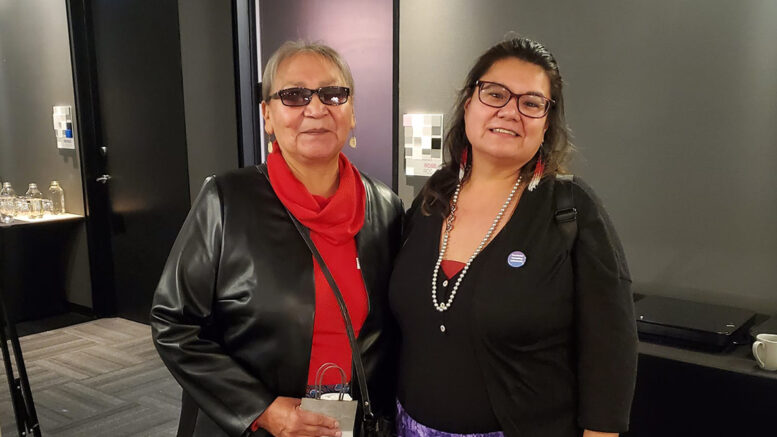By Chevi Rabbit, Local Journalism Initiative Reporter
(ANNews) – In a poignant discussion, Lori Deets, a resilient advocate for safe and affordable housing, sheds light on the challenges within Canada’s housing market. As a Sixties Scoop survivor and a committed member of The Pan-Canadian Voice for Women’s Housing (PCVWH), Deets emphasizes the urgent need to redefine housing as a fundamental human need.
“I believe that treating housing as a commodity has significantly harmed our country,” Deets states, underscoring the adverse effects of viewing housing primarily as an investment tool, exacerbating inequalities and making housing increasingly unattainable for many Canadians.
Participating in the 2023 PCVWH conference in Ottawa last year, Deets joined forces with prominent figures like Marie Houle, the Federal Housing Advocate at The Canadian Human Rights Commission, and Romy Bowers, CEO of CMHC. The event aimed to provide a platform for diverse voices, including women, gender-diverse individuals, and Indigenous women, to address ongoing housing issues.
“It’s not just about home ownership; it’s about creating communities where people can heal and belong,” Deets passionately emphasizes, highlighting the importance of community-building within housing policies.
Deets draws attention to the impact of corporations and affluent individuals acquiring housing stock, leading to unavailability and unaffordability, particularly affecting Indigenous and marginalized communities. Her advocacy calls for more inclusive housing policies that cater to the diverse needs of communities.
“The stark truth is that rental opportunities often hinge on factors like skin colour, creating a barrier for many,” acknowledges Deets. “As an Indigenous woman and a single mother, the persistent concern revolves around potential discrimination tied to both ethnicity and family status.”
“Without a home, leading a fulfilling life becomes an insurmountable challenge,” adds Deets, who faces personal challenges as a single mother navigating the rental market.
“And when you’re out there, it’s really hard. You’ve got to be out there talking to everyone,” she adds, emphasizing the daunting reality of seeking safe and affordable housing.
“And when you know, the terrible fact is that most people won’t rent to you based on your skin colour,” exposing the systemic challenges and harmful stereotypes created by society on Indigenous women.
“Now that I have more of an understanding of systemic racism, biases, and discrimination, I can kind of put some barriers up to protect myself, but it’s still really hard,” Deets reflects, acknowledging the resilience required to navigate a system marked by discrimination.
“The ongoing battle is demoralizing. Like everyone else, I yearn for nothing more than a secure place to call home.”
“Surviving in Canada is stressful when you don’t have a stable home,” said Deets.
“As a Sixties Scoop Survivor, I have more than one set of parents,” she reveals, shedding light on the intergenerational harm that Canada has created, perpetuated, and inflicted.
Despite being Indigenous on their ancestral lands, Canada has failed to facilitate homeownership for its Indigenous populations, depriving them of the opportunity to build generational wealth like their non-Indigenous counterparts.
“I have friends [who are] non-Indigenous, who are able to buy their homes -usually because their parents help them,” Deets shares, offering a glimpse into the disparities faced by different demographics.
The recent PCVWH conference in Ottawa delved into the financialization of Canada’s housing market. Many Canadians whose ancestors migrated to Canada have been able to obtain land. A comprehensive report authored by Martine August for the Office of the Federal Housing Advocate revealed the adverse effects of financialization on housing.
‘Summary Report for the Office of the Federal Housing Advocate,’ delves into the detrimental effects of financialization on Canada’s housing. Examining aspects like the 2008 crisis, Single Family Rentals, and seniors’ housing trends, the report urges a call to action for inclusive and equitable policies. It underscores the pressing need for collaborative efforts to rectify systemic housing issues, providing a clarion call for a more just and inclusive housing landscape.
Integral to PCVWH, the Federal Housing Advocate’s role involves making recommendations to improve housing laws, policies, and programs. PCVWH gives Deets a voice and a platform to connect with many other women facing challenges from diverse backgrounds, and also on reserve women like elder Lavenia Schug. PCVWH is a national project advocating for inclusive housing policies and has been actively driving change since 2017.
Deets says she feels “that society doesn’t think I, as an Indigenous woman can own a home.” There are harmful stereotypes placed on many Indigenous women, she adds, and its these stereotypes that harm, not just Indigenous women but all women. She says, “It’s hard when even my own family thinks that way; it’s the essence of projection.”
Deets ends the interview by saying that ideas like “Land Back” are great but need to have a solid plan behind the idea that’s realistic for Canadian Mortgage Housing Corporation (CMHC) to understand, “CHMC isn’t there yet; they don’t understand Land Back. This is why I didn’t bring the idea up while I was in Ottawa. I could tell they would not understand the concept.”
According to LandBack.Org, ‘Landback’ is a movement that has existed for generations with a long legacy of organizing and sacrifice to get Indigenous Lands back into Indigenous hands. Currently, there are ‘Landback’ battles being fought all across Turtle Island, to the north and the south.
Deets also says initiatives like the PCVWH are crucial as they connect lived expertise to leaders in the Canadian housing industry. For more information on PCVWH, check out www.pcvwh.ca.



Be the first to comment on "Paving the Way for Inclusive Housing: Lori Deets’ Advocacy Journey"